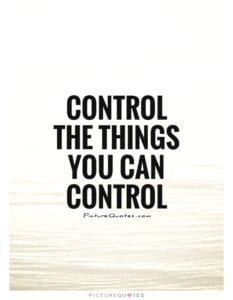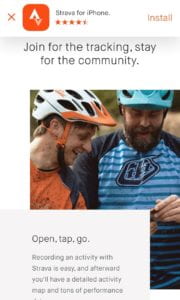FOCUS ON WHAT YOU CAN CONTROL
August 21, 2019 by Rick Clark
This week we welcome Regional Director of Admission (West Coast) Ashley Brookshire to the blog. Welcome, Ashley!
I loathe feeling out of control. My Type A personality enjoys organization, logical outcomes, and the authority to make decisions. Maybe that’s why adjusting to LA traffic has proven to be such a struggle.

If given the choice, I think most of us would choose being a driver over a passenger, especially in situations where we’re heavily invested in the outcome. Whether you’re putting an offer in on a house, waiting for test results, or doing something else that generally relinquishes your decision-making power to a third-party, it feels particularly chaotic and stressful.
Similarly, there are a lot of pieces of the college application process you can’t control. Worrying about who else is in the applicant pool for admission is misplaced; there’s nothing you can do to impact the decisions that individual students across the country make when it comes to their college applications.
Instead, focus on what you can control. Trust me – there is a lot within the admission process that puts you in the driver’s seat, even though sometimes it may not feel that way. Here are a few ideas to get you started.
What Matters?
You get to decide what matters to you in a college experience, and also decide how much time and effort you’ll exert to learn about colleges that offer those opportunities. The college search process should involve some soul searching, the benefits of which stretch far beyond creating a college list.
Take time to truly reflect on these questions:
- What excites you about college?
- Why do you want to go?
- Are there pressures coming from others in your life that are directing your search on your behalf?
- What type of environments allow you to thrive? Encourage you to grow? Make you happy?
You’re the one who will be calling this place your home away from home, not your parents, classmates, or overzealous neighbor. Wisdom and insights from others can be immensely helpful, but make sure you’re using this as a resource, not the final authority.
 Take time to figure out what you’re looking for—it’s much easier to find “it” if you know what “it” is.
Take time to figure out what you’re looking for—it’s much easier to find “it” if you know what “it” is.
Once you know the qualities of a college that excite you, start your search! There are more than 4,000 colleges in the US alone, and while many have overlapping traits, they also offer distinct communities and programs.
You get to decide how much time is spent in this process. If you truly take your time to learn more about yourself, as well as your educational options, then you’ll build confidence in yourself, as well as building a college list. If you’re only using word-of-mouth or quick ranking websites to build your list, then you’re leaving a lot of unknowns out there. Take time on the front end – it’ll direct the rest of your college search, all the way until you’ve made your final decision.
Set Your Pace
You control the time frame in which you work on your applications. An application deadline does not mean you have to submit your completed application during that 24-hour window. It means that—after weeks of time to compile your thoughts, achievements, and story—applications must be submitted no later than this date. You can decide how the work is broken up over the course of the weekends prior to the deadline, or if you’ll be using the last 2 hours ahead of the deadline to try to complete a well-polished application (spoiler alert: you likely will not put your best foot forward if you’re opting for the latter).
Be a Decision Maker
As mentioned before, you choose where you’ll submit your college applications. You get to set your priorities, craft your list, and actually apply to those schools. The colleges will evaluate the applications they’ve received against the institutional priorities set for them, then deliver the information back to students in the form of admission decisions. This particular step, the review of your application, falls into the “out of your control” category.
That being said, if the college needs additional information from you, they will reach out (check your email!). Make sure you’ve set up an organizational system to catch these important e-mails and requests! Need ideas? Check out this previous blog post.
Once admission decisions have been released, the ball is back in your court! You get to bookend this process as the decision-maker. From the collection of acceptance letters you’ve received, you now have the privilege of deciding where you’d like to attend (and these should all be from schools where you can see yourself enrolling. After all, you are the one who decided to apply in the first place!).
Managing anxiety and worry is challenging, but these emotions do not need to dominate your college search and selection. Take ownership, pride, and comfort in all the control you have in these processes, rather than dwelling on the few pieces that are out of your hands. Good luck!
 Ashley Brookshire is an Atlanta native and Georgia Tech alumna who has worked in college admission for more than nine years. Ashley serves as Georgia Tech’s Regional Director of Admission for the West Coast, making her home in Southern California.
Ashley Brookshire is an Atlanta native and Georgia Tech alumna who has worked in college admission for more than nine years. Ashley serves as Georgia Tech’s Regional Director of Admission for the West Coast, making her home in Southern California.
If you would like to subscribe to receive blog entries when they post, please enter your email address in the “subscribe” box at the top of the page. We welcome comments and feedback at @gtadmission on Twitter.
CATEGORIES: Ashley Brookshire, College Admission, Guest Blogger
WHAT ARE YOU STRAVA-ING FOR?
August 14, 2019 by Rick Clark
I run. That is to say I’m not a pure or true runner. True runners glide. True runners wear shorter shorts, lighter weight shirts, and have a shoe rotation system. True runners portion out food, drink blended stuff with weird combinations of veggies and powder, and talk a lot about running. I simply run. I enjoy the simplicity of leaving my house early in the morning, being the first to see late night road kill, and experiencing the quiet darkness when most the world is still sleeping or blearily rousing to make coffee.
We all need our head clearing experiences, moments of freedom, and frankly, time to be alone. With two big kids and a loud staff….wait, reverse that… with two loud kids and a big staff, running is one of the only times I can tune out the world, reflect, consider, plan, or simply let my mind go blank. However, in June I was visiting a friend in Asheville, NC who introduced me to an app called Strava. The program allows you to see total distance, pace per mile, elevation gain, and maps your route. Since he’s not on any other social media platform, his pitch was it would be a good way to keep up with each other, and it would offer some accountability on training. I suggested just texting, but he doesn’t do that much either.
I downloaded the app and started carrying my phone on runs, since I don’t have a fancy watch (because, again, I’m not a true runner. What he did not tell me is Strava also allows you to see who else has run your same route. So if you run a certain segment in your area and have the 10th fastest time or better, you receive “achievements” with medals for being 3rd or faster, and apparently a “crown” if you are the fastest on that hill or mile or loop.
Before I had this app, I rarely brought my phone with me on a run unless I needed the flashlight or wanted to listen to a podcast. Before I had the app, I’d come home with new ideas or perspective, or just feeling lighter (minus my legs) because I’d tuned out and refilled my proverbial cup. Lately, I’ve been coming back and checking to see my pace, achievements, and who else I know has run those segments. Even in the middle of runs, I’ve found myself thinking, “I need to PR (personal record—it tracks those too) this mile or loop.”
Strava also allows other runners and your own contacts (like my friend in Asheville) to give you “kudos” or comment on your run, hike, or bike ride. So, admittedly, after a particularly long run or faster route, I’ll check back later in the day to see if anyone interacted with my post.
What are you Strava-ing for?
If you are a high school senior, you are probably starting to work on your college applications. Before you start contemplating which essay topic to choose or ruminating on whether to use “raconteur” as a way of describing yourself in your supplemental essay question, ask these basic questions first:
Why?
I’ve had to reconsider why I run. As a senior, everyone will ask you “Where you want to go to college?” I’m hoping you’ll tune out those voices for a bit and go all the way back to crawling before walking, much less running. Before you submit even one application, take some time to write down, voice record, or type out your answers to “Why??”
- Why would you invest this much money in a college education?
- Why are you willing to work hard academically beyond high school to earn a particular degree?
- Why are you going to leave all of your friends, and the comfort of the known and move 500 miles away to sleep in a single bed and share an 8×8 room?
- Why are you going to study until 3 a.m. and eat coffee grounds to stay awake in preparation for a Differential Equations or British Literature exam?
Why is tough. It leads to big questions like who are you? And who do you want to be in the future?You may get there eventually, but you can start more simply with:
- Who do I hope to meet, connect with, and learn from in college?
- What opportunities do I want this experience to provide in the future?
- What type of people and learning environments bring out my best?
Ask anyone who has been to college and if they are honest, they can describe a dark, cold day in their first year when they sat on their all-too-firm mattress in their residence hall listening to a song that reminded them of high school friends or their hometown. They remember doing laundry at midnight alone, or leaving the library bleary-eyed and over-caffeinated. Social media will tell you that college is a never ending string of sunny days filled with groups of smiling friends going to class outside, but at some point every first-year student has the same questions rattle around in their head: “Why am I here?” “Did I make the right choice?” “Why does everyone else seem to be doing well, while I am struggling?” Everyone has that day. Everyone has those lonely walks, isolated thoughts and inevitable doubts. Everyone. Crawl first.
Where?
Look closely again at the list of colleges you are applying to. Why is each one on your list? If it is because it aligns with your answers above; you feel confident you would thrive in that environment; they offer the major you are excited to pursue; or you know people who are there that have a lot of similar interests and goals, then you are good to go. If it is just because your parents went there, it is highly ranked, you like their colors or mascot, or “someone told me it was good,” then take a step back. You need to wait to hit submit on every application until you’ve really considered how that places matches up with your whys. Walk on.
Who?
Listen. I don’t have all the answers. I’m over twice your age and a stupid running app has me all twisted up in the game right now. But I can tell you this: being at peace and confidently answering “Who is this really for?” is a pretty essential question to ask before you make any big life decision. Actually, it’s a pretty good one to ask each morning when you get dressed too. Who is the for?Is your “run” purely for you or is it because you want “kudos” from someone else? Is your first choice college first because it aligns with your whys, or because you think there will be some medal or crown for getting in? I’m not trying to be too dramatic here, but I’ve seen folks wake up in their 40’s realizing they’ve lived way too long without being honest about their answers to, “Who’s this really for?”
Last week I was really struggling with a decision. I needed to clear my head and process. So Saturday morning, I woke up early, grabbed my shoes, put on my longer-than-a-real-runner shorts, and headed out on a trail. No phone. No app. I have no idea how long, fast, or relatively well I ran that day. But I worked through my problem. I came back with a new way to approach the situation. I asked, “Why? And who is this really for?” The run, the process, the decision was purely mine. I knew what I was Strava-ing for. I can only wish the same for you. Run well, my friends.


No comments:
Post a Comment
Note: Only a member of this blog may post a comment.